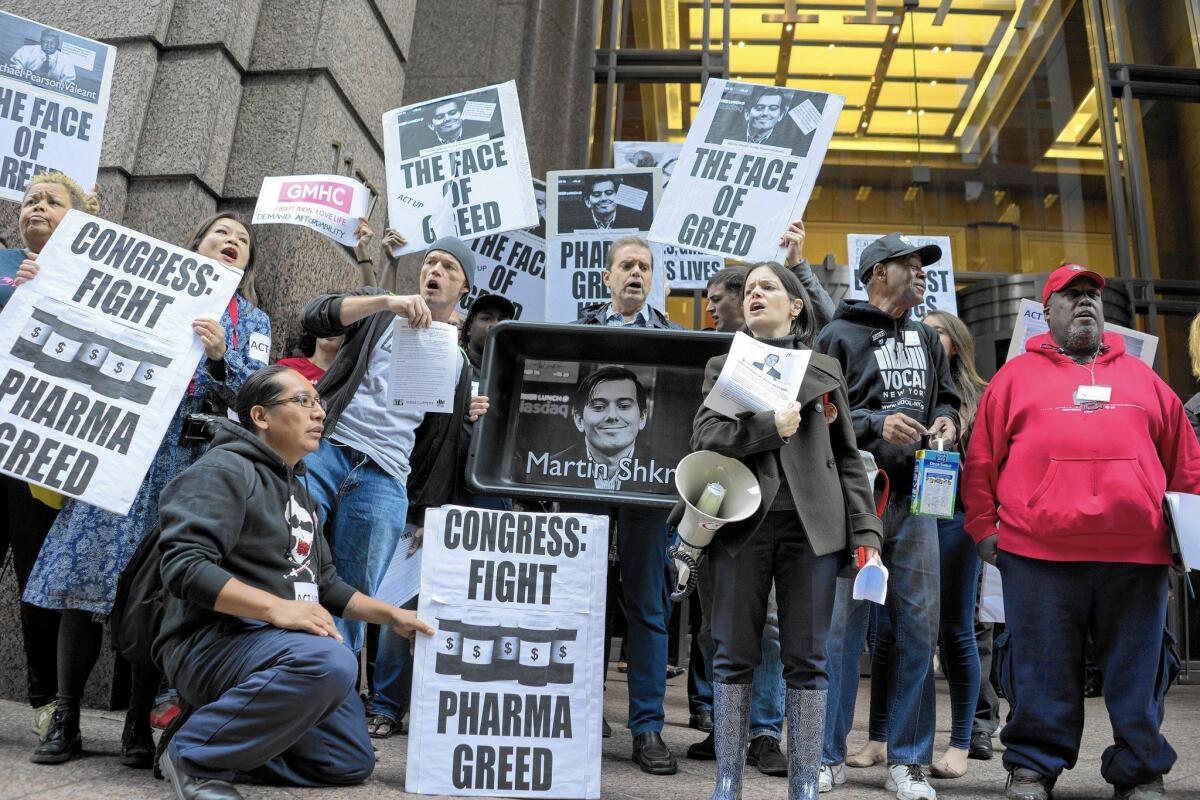How a $500 UCLA hospital copay turned into a $3,900 bill — for 1 injection

- Share via
Nobody wants to get sick. But if you do get sick, what you really don’t want is an illness that requires a so-called specialty drug.
These are the high-priced drugs you’ve seen in the news lately, such as the hepatitis C drug Sovaldi. It costs an eye-popping $1,000 a pill.
Or the tuberculosis drug cycloserine, which had cost about $500 for 30 capsules. It soared overnight to nearly $11,000 after being acquired by a new manufacturer and then went back down to $500 after the public reacted with stunned outrage.
Or consider Daraprim, used to treat parasitic infections. It got a new manufacturer that raised its price to $750 a tablet from $13.50. And then, once word got out, the company said it would lower the price by an unspecified amount.
“Price gouging like this in the specialty drug market is outrageous,” Democratic presidential candidate Hillary Clinton said of Daraprim last week while proposing steps to limit drug price hikes.
“That is not the way a market is supposed to work,” she said. “That is bad actors making a fortune off of people’s misfortune.”
Carlsbad resident Michael Krival thinks he got a taste of that medicine recently after his 9-year-old daughter was diagnosed by a UCLA specialist with a hormone disorder.
She was prescribed a series of injections of a specialty drug called Lupron Depot. As far back as 1993, researchers deemed the drug “safe and efficacious.”
Krival said he and his wife booked an appointment for their daughter at Ronald Reagan UCLA Medical Center. Before the scheduled visit, they received a written estimate from the hospital that their copay would be $500 for the first shot.
“That’s a lot,” Krival told me. “We understood that this drug must be expensive, but at least we knew how much we’d have to pay.”
They were told again that the copay would be $500 when they arrived for the appointment. The shot was administered by a nurse. It was all over in a few minutes.
The bill arrived this month. Krival’s copay wasn’t $500. It was $3,908.71.
The price of a 30-milligram injection of the drug, according to the bill, was $19,827.90. Because at least four shots would be needed, they were looking at pharmacy charges approaching $80,000 and nearly $16,000 in copays.
A 30-mg dose of Lupron Depot is available from Canadian pharmacies for under $2,000, according to the website PharmacyChecker.com.
The same dose can be purchased in the United States for about $7,500, according to Drugs.com. Other sites place the U.S. cost closer to $5,000.
Krival said if he’d known in advance that his UCLA copay would be almost $4,000, and that the total cost was almost $20,000, he’d have shopped around for other healthcare providers or sources of the drug.
“What they did was literally a bait and switch,” he said.
There’s the crux of it: Patients are placed at a significant disadvantage by a healthcare market that lacks clear pricing, and often are denied the opportunity to choose more affordable options.
The result is a medical marketplace that allows hospitals and drugmakers to routinely take advantage of people.
“It’s a huge problem,” said R. Lawrence Van Horn, a healthcare economist at Vanderbilt University. “There is no transparency in a market unless you can price something up front.”
He said rising deductibles for insurance plans make it even more important that patients have a chance to make informed healthcare choices.
“However, the market isn’t set up right now to be responsive to customers,” Van Horn said.
So what does UCLA have to say about Krival’s experience?
Amy Albin, a spokeswoman for UCLA Health Sciences, said the medical center got its wires crossed and mistakenly said the copay would be $500 when it was the deductible that was $500.
She said the problem involved the way UCLA contacted Krival’s insurer. “The error in our insurance verification process has been corrected,” Albin said.
She declined to comment on whether other patients have been affected by similar screw-ups. But it’s not hard to imagine that others were misled but didn’t question their bills.
Albin said UCLA’s sky-high charge for Lupron Depot “was set according to our policies, which add our overhead expenses to the wholesale cost which was paid to our supplier.” She said the hospital won’t comment on “pharmacy prices found on the Internet.”
All of this underlines the craziness of the U.S. healthcare system, which encourages people to take personal responsibility for their well-being but denies them the information they need to make wise decisions.
It also highlights, yet again, the pitfalls of a market with precious little regulation when it comes to pricing. Most other developed countries have strict laws intended to protect patients from being gouged by medical bills.
Take nothing for granted. If a bill seems too steep, ask questions. If you don’t get satisfactory answers, make a fuss or bring in a professional patient advocate to help mediate.
A UCLA service rep told Krival he was responsible for the $4,000 copay. But when I brought the matter to Albin, she said that, upon further reflection, the hospital would honor its written estimate and charge only $500 — this time.
“If the daughter returns for future visits,” she said, “then they will be informed accurately as to the responsibility for payments.”
That won’t be an issue. Krival told me he’ll find another provider for his daughter’s next shot and will verify in advance how much is being charged for the medicine.
“It just baffles me,” he said, “that this is the one type of business where they act like you’re crazy if you question how much something costs.”
You’re not. You’re doing exactly what you should do to ensure you’re treated fairly.
Although it shouldn’t be necessary.
David Lazarus’ column runs Tuesdays and Fridays. He also can be seen daily on KTLA-TV Channel 5 and followed on Twitter @Davidlaz. Send your tips or feedback to [email protected].
More to Read
Inside the business of entertainment
The Wide Shot brings you news, analysis and insights on everything from streaming wars to production — and what it all means for the future.
You may occasionally receive promotional content from the Los Angeles Times.











